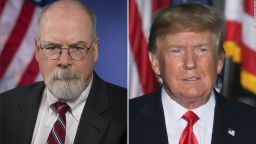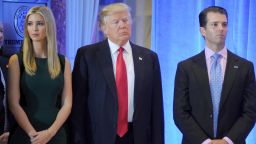Special counsel John Durham said Thursday he wasn’t trying to inflame partisanship and media commentary with a recent cryptic filing that prompted former President Donald Trump and others to go on the attack about Democrats and the FBI’s early Russia investigation.
Durham was criticized this week by lawyers for defendant Michael Sussmann, whom he has charged with lying to the FBI about his representation of the Democratic Party in 2016, for including misleading information in a filing about computer data Sussmann had access to related to phones around the White House. The data was from before Trump took office, yet Trump and several right-wing commentators, including on Fox News and Republican politicians, said Durham found evidence of spying and hacking Trump.
“If third parties or members of the media have overstated, understated, or otherwise misinterpreted facts contained in the Government’s Motion, that does not in any way undermine the valid reasons for the Government’s inclusion of this information,” Durham’s team wrote in a court filing Thursday.
“Defense counsel has presumed the Government’s bad faith and asserts that the Special Counsel’s Office intentionally sought to politicize this case, inflame media coverage, and taint the jury pool. That is simply not true,” Durham added.
Durham’s filing came after Sussmann described Durham’s investigation as “prosecutorial overreach” in a court filing on Thursday, seeking to have his charge thrown out.
Durham has charged Sussmann with lying to then-FBI General Counsel James Baker about representing Hillary Clinton and a tech company. In the meeting with Baker, Sussmann shared suspicious computer data that seemed to suggest Trump and his associates had contact with a Russian bank.
Sussmann, formerly a lawyer with the Democratic Party-tied law firm Perkins Coie, has maintained that he didn’t lie to Baker about who he represented. Thursday, Sussmann argued that ultimately didn’t matter to the FBI’s Russia investigation, which at the time was in its infancy.
“He met with the FBI, in other words, to provide a tip. There is no allegation in the indictment that the tip he provided was false. And there is no allegation that he believed that the tip he provided was false,” Sussmann’s legal team wrote.
Durham has been investigating the origins of the FBI’s probe into supposed ties between Trump and Russia, which eventually netted several convictions of top Trump advisers. But no one was charged with a conspiracy with Russia, and when the FBI investigated suspicions of a Trump Organization-Russia connection, it found “insufficient evidence” of a secret communications channel, prosecutors said.
Earlier this week, Sussmann pushed back against Durham after the special counsel insinuated that he and the tech company he represented also misled the CIA about the use of Russian phones around Trump, in a vague court filing last Friday. Sussmann and the tech executive he worked with, Rodney Joffe, say they did not aim to manipulate federal officials out of political animus, and that Durham’s suggestions, which quickly took off in right-wing media, were wrong.
Sussmann argued some of the details were wrong, and shouldn’t have been included in court filings in the first place because they were not a central part of the case. Durham had included the details in an argument about possible conflicts of interest for Sussmann’s lawyers as he heads to trial.
Sussmann is scheduled to have a trial in May. But first, the federal judge overseeing the case, Christopher “Casey” Cooper of the DC District Court, must decide whether the prosecutors’ case is legally sound enough to move forward. Sussmann’s team says Durham’s approach to the case could harm free speech, “dissuade honest citizens from coming forward with tips, and chill the advocacy of lawyers who interact with the government,” according to his filing.






